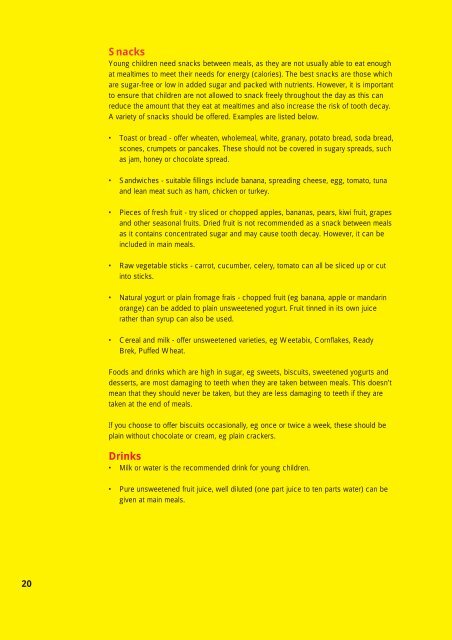Nutrition matters for the early years - Health Promotion Agency
Nutrition matters for the early years - Health Promotion Agency
Nutrition matters for the early years - Health Promotion Agency
Create successful ePaper yourself
Turn your PDF publications into a flip-book with our unique Google optimized e-Paper software.
Snacks<br />
Young children need snacks between meals, as <strong>the</strong>y are not usually able to eat enough<br />
at mealtimes to meet <strong>the</strong>ir needs <strong>for</strong> energy (calories). The best snacks are those which<br />
are sugar-free or low in added sugar and packed with nutrients. However, it is important<br />
to ensure that children are not allowed to snack freely throughout <strong>the</strong> day as this can<br />
reduce <strong>the</strong> amount that <strong>the</strong>y eat at mealtimes and also increase <strong>the</strong> risk of tooth decay.<br />
A variety of snacks should be offered. Examples are listed below.<br />
• Toast or bread - offer wheaten, wholemeal, white, granary, potato bread, soda bread,<br />
scones, crumpets or pancakes. These should not be covered in sugary spreads, such<br />
as jam, honey or chocolate spread.<br />
• Sandwiches - suitable fillings include banana, spreading cheese, egg, tomato, tuna<br />
and lean meat such as ham, chicken or turkey.<br />
• Pieces of fresh fruit - try sliced or chopped apples, bananas, pears, kiwi fruit, grapes<br />
and o<strong>the</strong>r seasonal fruits. Dried fruit is not recommended as a snack between meals<br />
as it contains concentrated sugar and may cause tooth decay. However, it can be<br />
included in main meals.<br />
• Raw vegetable sticks - carrot, cucumber, celery, tomato can all be sliced up or cut<br />
into sticks.<br />
• Natural yogurt or plain fromage frais - chopped fruit (eg banana, apple or mandarin<br />
orange) can be added to plain unsweetened yogurt. Fruit tinned in its own juice<br />
ra<strong>the</strong>r than syrup can also be used.<br />
• Cereal and milk - offer unsweetened varieties, eg Weetabix, Cornflakes, Ready<br />
Brek, Puffed Wheat.<br />
Foods and drinks which are high in sugar, eg sweets, biscuits, sweetened yogurts and<br />
desserts, are most damaging to teeth when <strong>the</strong>y are taken between meals. This doesn’t<br />
mean that <strong>the</strong>y should never be taken, but <strong>the</strong>y are less damaging to teeth if <strong>the</strong>y are<br />
taken at <strong>the</strong> end of meals.<br />
If you choose to offer biscuits occasionally, eg once or twice a week, <strong>the</strong>se should be<br />
plain without chocolate or cream, eg plain crackers.<br />
Drinks<br />
• Milk or water is <strong>the</strong> recommended drink <strong>for</strong> young children.<br />
• Pure unsweetened fruit juice, well diluted (one part juice to ten parts water) can be<br />
given at main meals.<br />
20

















